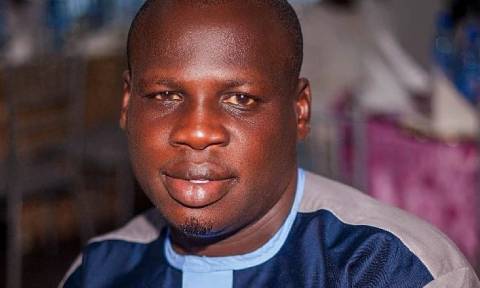The name Pita Nwana, rings no bell, but in the literary community and perhaps, among the Igbos, it is one name that commands a lot of influences. A renowned carpenter and foreman at Methodist College, Uzuakoli, Abia State, Nwana was the author of the foremost novel ever written in Igbo language called Omenuko.
Omenuko chronicles the true life story of a quintessential Igbo businessman, otherwise known as Chief Igwegbe Odum of Ndizuogu who lived between the 19th and 20th centuries. Over the years, the urge to re-invoke the spirit of the man, Omenuko have been met with strong resistance.
Only three years ago, the elegant Stallion as she is better known Onyeka Onwenu, set out with a team of professionals to adapt the novel into a screenplay but unfortunately, that mulch-million Naira movie project did not see the light of the day.
However, determined to see that the story of Omenuko did not die with the author, the 85 year old second son of the famous novelist, Mazi Harry Nwana has come out to advocate support from all and sundry in ensuring that the novel is either translated into English language or adapted as a screenplay.
He also explained reasons the attempts by Onyeka and her team to shoot the epic movie three years ago was not actualized amongst other engaging issues surrounding the the Igbo novel.
The journey…
Translating the novel into English Language I have been getting a lot of representations from my friends and associates about the need to adapt my father’s first Igbo novel “Omenuko” into a screenplay. Though there has been a lot of impediments here and there ; some of them are man-made while others are legal. The legal aspect of it has to do with the copyright which belongs to the Long man Publishing Company .
The company have been reluctant to grant permission to the writers who wants to translate the work into English language or adapt it as a screenplay. I approached the company to fashion out ways of translating the novel into English language. At the moment, the management of the company have agreed in principles, to give a go-ahead order to any writer that wants to translate the work.
For me, I’m not physically strong enough to do the running around .That’s why I’m enjoining anybody who is interested in translating the novel either into English language,or adaptation into a screenplay to take a bold step and come for a negotiation.
Omenuko is an old novel, which depicts the life of a quintessential Igbo man, Omenuko, who lived between the 19th and 20th centuries. I’m looking for a writer who can grantee me that he will be able to do a good translation that will be commercially viable. It remains the most popular novel in Igbo language today, which deserves to be made available to other Nigerian languages.
For screenplay
Sometimes ago , our Lady of songs Onyeka Onwenu assembled a team of professionals who wanted to adapt the novel into a screenplay. But the reason the project was not executed was because the descendants of “Omenuko “demanded a lot of money from the team. That was why Onyeka decided to abandon the project .
But I’m still interested in revisiting the project. I want the novel to be adapted into a screen play. A lot of people have approached me to talk about it. But I relayed the difficulties one faced in trying to adapt the work into a screenplay. If I see somebody who will be willing to take up the challenge, I wouldn’t mind reopening talks with the publishers of the novel again. I have discussed with the publishers before now, and they are willing to support the initiative.
Descendants of Omenuko and Pita Nwana
There are two different families who are involved in this issue. They are the families of Pita Nwana, the author of the novel, and that of the subject- Omenuko .Pita Nwana, my father only wrote about Omenuko, which was a true life story of a popular Igbo trader who lived between 19th and 20th centuries. Everybody knew the man as Omenuko .
The novel was not a fiction, rather it was a true life story that was weaving around the Omenuko. As you would want to know, the real name of the main character in the novel was Iguegbe. He was an enterprising member of the ubiquitous Odum family.
Odum was late K.O .Mbadiwe’s grandfather .So ,Iguegbe was one of his uncles. When Onyeka wanted to adapt the novel into a screen play, she approached a senior member of the Odum’s family, Ambassador Greg Mbadiwe to get clearance from them to carry out the project. Ambassador Greg introduced Onyeka to Osuofia Mbadiwe who welcomed the idea and promised to meet with his family members over the proposal. While Osuofia was busy inviting his family members for a meeting, he insisted that a representative from Pita Nwana’s family must be in attendance. As a result, I attended the meeting with my daughter , it was a meeting of the family of the subject and that of the author.
Also, Onyeka was in attendance with her team. After the meeting , we unanimously gave our supports to the project. But unfortunately, and to my greatest surprise, I later learnt from Onyeka that the project was not carried out, as a result of the fact that some members of the Odum’s family accused those that attended the meeting of collecting a huge amount of money, which ran into millions of Naira from the project executors. They therefore insisted that they should be given their own share of the windfall.
In principles, no money was mentioned during the discussion. But they wouldn’t believe us . At this juncture, Onyeka who couldn’t withstand the disagreement decided to abandon the project .That’s how the project was not executed to the best of my knowledge.
It was an unfortunate situation, but there was nothing we could have done to savage it. In any case, the outcome of that unrealised project neither killed my interest, nor the interests of other members of the Odum’s family.
The man, Omenuko
The novel is fictionalised biography of Chief Iguegbu Odum of Ndizuogu, who lived from about 1860 to 1940.
The real name of the man was not disclosed by my father because he doubted the possibility of Iguegbe’s taking it kindly with him, after flattering his role as a slave



















